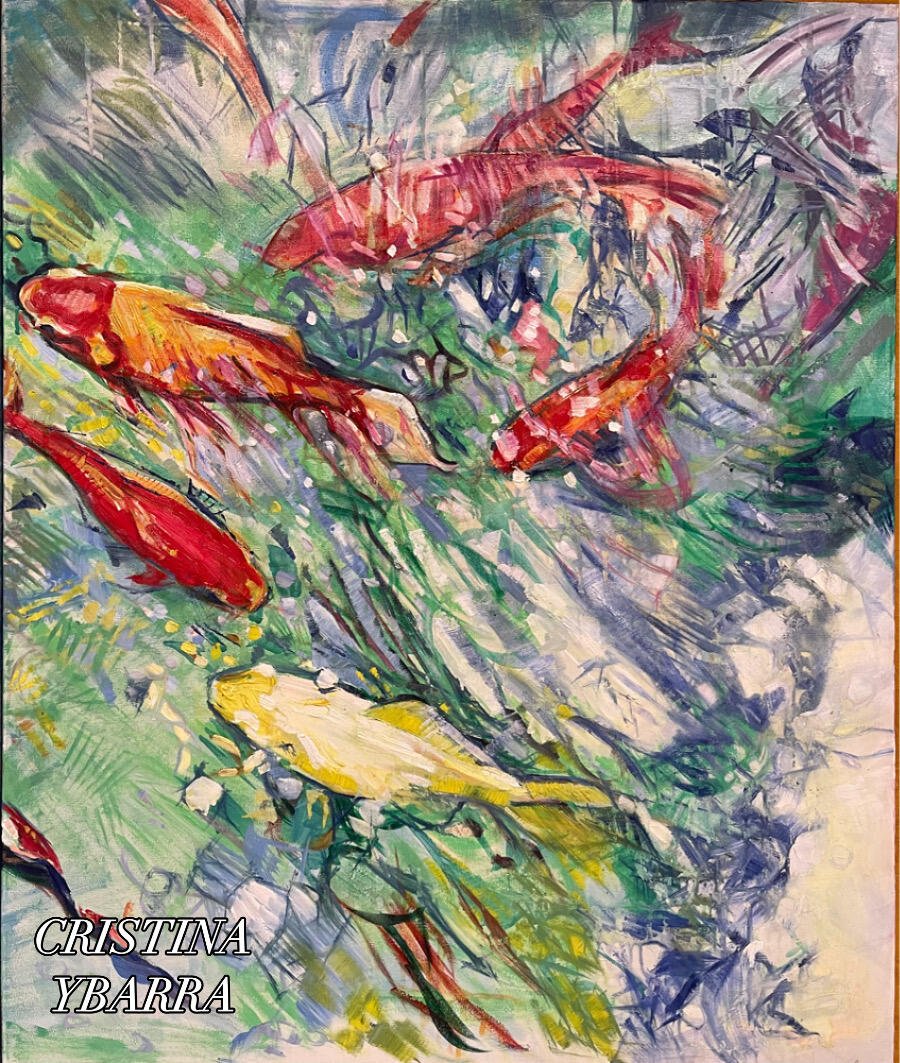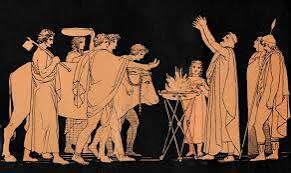Derek Ross
posted
11 days ago
Haha. Definitely. I have a second ribeye that I was going to cook for myself but I decided to save that for tomorrow and make roasted asparagus and garlic mashed potatoes too.
rabble
posted
11 days ago
nostr:npub1acg6thl5psv62405rljzkj8spesceyfz2c32udakc2ak0dmvfeyse9p35c yeah I mostly saw clips so I fully admit that I was likely seeing a distorted view.
Trump is clearly very good at campaigning and the media. I don’t like him or his politics but he’s incredibly effective. It works for winning elections.
I mean we both voted in NZ where we live. I voted for the Green Party, my guess is you voted National or ACT…. Neither are Democrats or Republicans. ;)
The Fishcake🐶🐾
posted
11 days ago
GM🫡☕️☕️☕️
77c2a730:39e0ca1d
posted
11 days ago
Esta obra puede ser completada por la que subiré siguiente a su izquierda… peces Koi… el formato es grande. El
Tríptico, las dos obras terminada miden 140 x 200 cm. #available #bitcoin #art 

a2eddb26:e2868a80
posted
11 days ago
At your service for #FITS
#bitcoin
 nostr:nevent1qqsp53z5z5mmy0l89tnwmh7s9hu6dup526ryp7338s2mdmgeqlwq62spp4mhxue69uhkummn9ekx7mqzyr7j6upczxu3egqhg5u22hjfnsm580aktd0uwdnvzhe2jj9mwaz3cqcyqqqqqqgvm7hps
nostr:nevent1qqsp53z5z5mmy0l89tnwmh7s9hu6dup526ryp7338s2mdmgeqlwq62spp4mhxue69uhkummn9ekx7mqzyr7j6upczxu3egqhg5u22hjfnsm580aktd0uwdnvzhe2jj9mwaz3cqcyqqqqqqgvm7hps
 nostr:nevent1qqsp53z5z5mmy0l89tnwmh7s9hu6dup526ryp7338s2mdmgeqlwq62spp4mhxue69uhkummn9ekx7mqzyr7j6upczxu3egqhg5u22hjfnsm580aktd0uwdnvzhe2jj9mwaz3cqcyqqqqqqgvm7hps
nostr:nevent1qqsp53z5z5mmy0l89tnwmh7s9hu6dup526ryp7338s2mdmgeqlwq62spp4mhxue69uhkummn9ekx7mqzyr7j6upczxu3egqhg5u22hjfnsm580aktd0uwdnvzhe2jj9mwaz3cqcyqqqqqqgvm7hps
₿$₱
posted
11 days ago
$75,948.57 / #bitcoin
≅ ₱4,430,460.42
🟢 0.34% ≅ ₱14,977.06
atyh
posted
11 days ago
interesting thread.
i learned some people hide hashtags in metadata nostr:note15zk5d638pj4a4gjswn5w27eevfpupkj8jxd89ufhnm2gy9fsln5qrcljyp
SLCW
posted
11 days ago
Red meat makes me feral. I'd be crouched in the corner with all that, snarling and snapping at anyone who got too close. 🥩
13f42a5b:903021a7
posted
11 days ago
Nobody owns enough #bitcoin
37f2654c:3c48723a
posted
11 days ago
3D Chess!
#meme
#JustAJoke
 nostr:note1tzslw5vsdq3fytc42rakdej8rn0gq2vetdgvlvw5uh7txgca092q5vk76g
nostr:note1tzslw5vsdq3fytc42rakdej8rn0gq2vetdgvlvw5uh7txgca092q5vk76g
 nostr:note1tzslw5vsdq3fytc42rakdej8rn0gq2vetdgvlvw5uh7txgca092q5vk76g
nostr:note1tzslw5vsdq3fytc42rakdej8rn0gq2vetdgvlvw5uh7txgca092q5vk76g
MADEX
posted
11 days ago
making madex episodes is hard... the only way i can pull this off, is if we all understand that the first dozen are going to be pretty rough 😅
Derek Ross
posted
11 days ago
The New York strips 🥹 Ribeye for dad.
rabble
reposted
11 days ago
{"pubkey":"0371db7fd4437ce63e60dedc313cad6ee8b17fc691fe05231f9a140134fc0d08","content":"Social graph liberation on #nostr?\n\nNostr's potential lies in community-led adoption, where genuine influencers—not algorithms—guide followers to new spaces.\n\nnostr:npub1az9xj85cmxv8e9j9y80lvqp97crsqdu2fpu3srwthd99qfu9qsgstam8y8 and nostr:npub1wmr34t36fy03m8hvgl96zl3znndyzyaqhwmwdtshwmtkg03fetaqhjg240 break down the social mechanics in BR086.\nhttps:\/\/m.primal.net\/LwEP.mov","tags":[["p","e88a691e98d9987c964521dff60025f60700378a4879180dcbbb4a5027850411"],["p","76c71aae3a491f1d9eec47cba17e229cda4113a0bbb6e6ae1776d7643e29cafa"],["t","nostr"]],"kind":1,"id":"58d63064e819f7586f9897777eed26d63e7695d1252cc16868d2b970ec1796f5","sig":"cf1671f4e4a93ac826754242cf5d6220242e43349667a8ba62d54ce21f658e9a44cf26d701b7315262b3463dcb8d82f055bc28cfa97148e36c384357f81e924f","created_at":1731019567}
noBody𓅦🧱
posted
11 days ago
Welcome to nostr ser
733fcc25:471bf3ec
posted
11 days ago
BITCOIN WARNING! 🚨⬇️
The market is taking a hit! Our bot has detected a strong selling opportunity for #Bitcoin.
Sell your #BTC now and lock in those profits while they're hot! 🔥
Signal: SELL
Disclaimer: Our bot's signals are not investment advice. Always do your own research and consult with a financial expert before making any investment decisions.
elsat
posted
11 days ago
nostr:npub180cvv07tjdrrgpa0j7j7tmnyl2yr6yr7l8j4s3evf6u64th6gkwsyjh6w6 nostr:npub10000003zmk89narqpczy4ff6rnuht2wu05na7kpnh3mak7z2tqzsv8vwqk is
Njump.me/Fiatjafs-Note-On-Nostr-NoteIDscarylink123
Friendlier than
Njump.me/noteIDscarylink123
0682bb33:f27c84b6
posted
11 days ago
11月8日は
* レポーターの日(PRC)
* 立冬(🇯🇵、2007年・2011年・2015年・2019年)
* 火焚祭(🇯🇵)
* ボイラーデー(🇯🇵)
* 信楽たぬきの日(🇯🇵)
* 刃物の日(🇯🇵)
* いい歯の日(🇯🇵)
* いい歯ならびの日(🇯🇵)
* 梱包の日(🇯🇵)
* 八ヶ岳の日(🇯🇵)
* 世界都市計画の日
* レントゲンの日(🇯🇵)
* いいおっぱいの日
#今日は何の日
hodlcuban
posted
11 days ago
Got it, thanks
NunyaBidness
posted
11 days ago
All those metrics are pure fiction.
HODL
posted
11 days ago
lol in my case it’s adhd
b88223d4:6097b5ba
posted
11 days ago
Keep doing pull ups 😅
there are no excuses not to do pull-ups 😉🙃


0f389bba:9b3f148f
posted
11 days ago
🌊 SURF 'N TURF 🏝️
-THE ISLAND LIFE-
https://image.nostr.build/65433ba376857f5b34235833b23ff0b019087edcba27fa4477316605ae111d5a.jpg
When you hear the word “Pagan,” what’s the first thing that comes to mind?
Is it positive or negative?
If you come from a Christian background, you might have some misgivings about the word, perhaps even equate it with other terms like “heathen” or “godless.”
https://image.nostr.build/bc36328fdbf3bfbe2835ed9596046c9b0ece1531f536ef35b13e9cad41082c2c.jpg
Paganism is a term that first arose among the Christian community of southern Europe during late antiquity as a way of identifying religions other than their own, or the related Abrahamic religions; e.g., Judaism and Islam. In other words, Paganism as a title was intended only to reference non-Christians and the non-Jews. Ultimately, Paganism came to be equated by Christians with a sense of hedonism, representing those who are sensual, materialistic, self-indulgent, unconcerned with the future, and uninterested in sophisticated religion.
Outside of Christian circles, the term Paganism typically refers to an expression of spirituality based on a reverence for nature.
They often draw on the traditional religions of indigenous peoples throughout the world.
Paganism is nature-based and holds a concept of the divinity of Nature, which they view as a manifestation of the divine, not as the fallen creation found in dualistic cosmology.
Paganism also puts emphasis on the sacred feminine, recognizing the "the female divine principle," identified as "the Goddess" beside or in place of the male divine principle as expressed in the Abrahamic God.
 Back in my religious days I would have equated "paganism" with something sinful, evil or demonic. Then I investigated it for myself. The core of paganism is being in integral relationship with the earth.
You might be surprised to find that some of the central values of paganism include:
1. Love for and kinship with nature. Reverence for the life force and its ever-renewing cycles of life and death.
2. A positive morality, in which the individual is responsible for the discovery and development of their true nature in harmony with the outer world and community.
This is often expressed as: "Do what you will, as long as it harms none."
3. Responsibility of beliefs.
The most basic tenant of paganism is that it is your own responsibility, not the responsibility of any government, institution, church or other people, to choose what you believe in regards to spirituality, values, ethics, the nature of ultimate reality, etc.
4. Personal responsibility for your actions and personal development. The development of your personal beliefs, morals and ethics is your own responsibility.
The belief that we are products of our own environment does not stand within the pagan structure, as paganism teaches that it is the responsibility of each individual to learn to recognize what is right from wrong, regardless of our early influences.
5. Everything is sacred.
Most pagan religions believe that everything in the universe is sacred.
For many pagans, all parts of our universe are considered divine and as such, sacred and worthy of our deepest respect.
We should be grateful for our Pagan friends for maintaining and promoting an integral connection between spirituality and nature. In my own personal spiritual growth and the work I do with others through my spiritual direction practice, Ive been exploring the area of ecopsychology.
Ecopsychology seeks to reshape modern psychology by showing that it cannot stand apart from an intimate human connection with the natural environment.
The premise is that we need that connection with nature to do well mentally and physically, and flourish as individuals and as a species.
https://image.nostr.build/dd25e7ee875eca411b99d921e29a3cbda1943c11ea73ecc7eff120ba78bf81e5.jpg
Ecopsychology offers three primary insights:
1. There is a deeply bonded and reciprocal relationship between humans and nature.
2. The illusion of a separation of humans and nature leads to suffering both for the environment and for humans
3. The recognition that the connection between humans and nature is healing for both
It might be assumed that Christianity and Paganism would be at odds with each other, but in my view, Jesus embraced many of the values espoused by Pagans. Jesus taught people to be a “neighbor”– to care about the needs, hardships and struggles of other human beings. Caring for the planet is one of the most important ways of truly being a “neighbor.”
It doesnt take long to discover that environmental degradation has a disastrous impact on the health, well-being and survival of countless people around the world. The opening scene of the Bible is a picture of wholeness and harmony between God, the natural creation and human beings and Jesus alluded to this imagery when he envisioned the reality of the “Kingdom of God" on earth.
There is also a category of Pagans identified as "Humanistic Paganism," which is a unique Pagan orientation for those who are uncomfortable with or skeptical of the supernatural or metaphysical elements of contemporary Paganism. Humanistic Paganism is Paganism that is firmly rooted in the empirical world.
A person may be drawn to Paganism by its down-to-earth orientation but turned-off by other aspects of Paganism, such as the belief in instrumental magic (the belief that thought can cause change in the physical world without corresponding physical action), New Age trappings like crystals, or the literal belief in gods as sentient beings.
For some, this kind of Paganism too closely resembles the other-worldliness of the transcendental religions they left behind.
These Pagans may find a home among Humanistic Pagans who share a love of the myth and ritual of Paganism but not what they see as its irrational credulity and superstition.
15 guiding principles of Humanistic Paganism are:
- Ethical behavior does not require a religion
- All living things have a unique spirit or soul
- The equality of genders, races, and all humans
- Care must be taken in using nature's resources
- All earths life is connected and interdependent
- The Gaia Principle is an important, basic, truth
- The cycles of nature teach us what is important
- Balance must be maintained for all life to flourish
- Our health depends on the environments health
- Our individual actions can and do have consequences
- Evolution is an ongoing process that occurs in all species
- Birth, living and death are natural cycles shared by all life
- Respect for ourselves requires respect for the earth
- All human cultures have value and can teach us
- Gods & Goddesses can be seen as metaphors
Its unfortunate that our religious, spiritual and philosophical differences wall us off from each other.
If we took the time to truly know one another, we would find profoundly meaningful things we share in common with each other.
Center for Non-Religious Spirituality- Jim Palmer.
https://image.nostr.build/49667667fc72116a8203e6e1b33fb71416f2ad38fa04ebedb0abff99c488360a.jpg
Credits goes to the respective
Author ✍️/ Photographer📸
🐇 🕳️
#Bitcoin #Satoshis #Freedom #Apocalypse #Music #Movies #Philosophy #Literature
#Grownostr #Stoicism #Nature
APOCALYPSE ANONYMOUS by
ATOSHI ANARKOMOTO
Back in my religious days I would have equated "paganism" with something sinful, evil or demonic. Then I investigated it for myself. The core of paganism is being in integral relationship with the earth.
You might be surprised to find that some of the central values of paganism include:
1. Love for and kinship with nature. Reverence for the life force and its ever-renewing cycles of life and death.
2. A positive morality, in which the individual is responsible for the discovery and development of their true nature in harmony with the outer world and community.
This is often expressed as: "Do what you will, as long as it harms none."
3. Responsibility of beliefs.
The most basic tenant of paganism is that it is your own responsibility, not the responsibility of any government, institution, church or other people, to choose what you believe in regards to spirituality, values, ethics, the nature of ultimate reality, etc.
4. Personal responsibility for your actions and personal development. The development of your personal beliefs, morals and ethics is your own responsibility.
The belief that we are products of our own environment does not stand within the pagan structure, as paganism teaches that it is the responsibility of each individual to learn to recognize what is right from wrong, regardless of our early influences.
5. Everything is sacred.
Most pagan religions believe that everything in the universe is sacred.
For many pagans, all parts of our universe are considered divine and as such, sacred and worthy of our deepest respect.
We should be grateful for our Pagan friends for maintaining and promoting an integral connection between spirituality and nature. In my own personal spiritual growth and the work I do with others through my spiritual direction practice, Ive been exploring the area of ecopsychology.
Ecopsychology seeks to reshape modern psychology by showing that it cannot stand apart from an intimate human connection with the natural environment.
The premise is that we need that connection with nature to do well mentally and physically, and flourish as individuals and as a species.
https://image.nostr.build/dd25e7ee875eca411b99d921e29a3cbda1943c11ea73ecc7eff120ba78bf81e5.jpg
Ecopsychology offers three primary insights:
1. There is a deeply bonded and reciprocal relationship between humans and nature.
2. The illusion of a separation of humans and nature leads to suffering both for the environment and for humans
3. The recognition that the connection between humans and nature is healing for both
It might be assumed that Christianity and Paganism would be at odds with each other, but in my view, Jesus embraced many of the values espoused by Pagans. Jesus taught people to be a “neighbor”– to care about the needs, hardships and struggles of other human beings. Caring for the planet is one of the most important ways of truly being a “neighbor.”
It doesnt take long to discover that environmental degradation has a disastrous impact on the health, well-being and survival of countless people around the world. The opening scene of the Bible is a picture of wholeness and harmony between God, the natural creation and human beings and Jesus alluded to this imagery when he envisioned the reality of the “Kingdom of God" on earth.
There is also a category of Pagans identified as "Humanistic Paganism," which is a unique Pagan orientation for those who are uncomfortable with or skeptical of the supernatural or metaphysical elements of contemporary Paganism. Humanistic Paganism is Paganism that is firmly rooted in the empirical world.
A person may be drawn to Paganism by its down-to-earth orientation but turned-off by other aspects of Paganism, such as the belief in instrumental magic (the belief that thought can cause change in the physical world without corresponding physical action), New Age trappings like crystals, or the literal belief in gods as sentient beings.
For some, this kind of Paganism too closely resembles the other-worldliness of the transcendental religions they left behind.
These Pagans may find a home among Humanistic Pagans who share a love of the myth and ritual of Paganism but not what they see as its irrational credulity and superstition.
15 guiding principles of Humanistic Paganism are:
- Ethical behavior does not require a religion
- All living things have a unique spirit or soul
- The equality of genders, races, and all humans
- Care must be taken in using nature's resources
- All earths life is connected and interdependent
- The Gaia Principle is an important, basic, truth
- The cycles of nature teach us what is important
- Balance must be maintained for all life to flourish
- Our health depends on the environments health
- Our individual actions can and do have consequences
- Evolution is an ongoing process that occurs in all species
- Birth, living and death are natural cycles shared by all life
- Respect for ourselves requires respect for the earth
- All human cultures have value and can teach us
- Gods & Goddesses can be seen as metaphors
Its unfortunate that our religious, spiritual and philosophical differences wall us off from each other.
If we took the time to truly know one another, we would find profoundly meaningful things we share in common with each other.
Center for Non-Religious Spirituality- Jim Palmer.
https://image.nostr.build/49667667fc72116a8203e6e1b33fb71416f2ad38fa04ebedb0abff99c488360a.jpg
Credits goes to the respective
Author ✍️/ Photographer📸
🐇 🕳️
#Bitcoin #Satoshis #Freedom #Apocalypse #Music #Movies #Philosophy #Literature
#Grownostr #Stoicism #Nature
APOCALYPSE ANONYMOUS by
ATOSHI ANARKOMOTO
 Back in my religious days I would have equated "paganism" with something sinful, evil or demonic. Then I investigated it for myself. The core of paganism is being in integral relationship with the earth.
You might be surprised to find that some of the central values of paganism include:
1. Love for and kinship with nature. Reverence for the life force and its ever-renewing cycles of life and death.
2. A positive morality, in which the individual is responsible for the discovery and development of their true nature in harmony with the outer world and community.
This is often expressed as: "Do what you will, as long as it harms none."
3. Responsibility of beliefs.
The most basic tenant of paganism is that it is your own responsibility, not the responsibility of any government, institution, church or other people, to choose what you believe in regards to spirituality, values, ethics, the nature of ultimate reality, etc.
4. Personal responsibility for your actions and personal development. The development of your personal beliefs, morals and ethics is your own responsibility.
The belief that we are products of our own environment does not stand within the pagan structure, as paganism teaches that it is the responsibility of each individual to learn to recognize what is right from wrong, regardless of our early influences.
5. Everything is sacred.
Most pagan religions believe that everything in the universe is sacred.
For many pagans, all parts of our universe are considered divine and as such, sacred and worthy of our deepest respect.
We should be grateful for our Pagan friends for maintaining and promoting an integral connection between spirituality and nature. In my own personal spiritual growth and the work I do with others through my spiritual direction practice, Ive been exploring the area of ecopsychology.
Ecopsychology seeks to reshape modern psychology by showing that it cannot stand apart from an intimate human connection with the natural environment.
The premise is that we need that connection with nature to do well mentally and physically, and flourish as individuals and as a species.
https://image.nostr.build/dd25e7ee875eca411b99d921e29a3cbda1943c11ea73ecc7eff120ba78bf81e5.jpg
Ecopsychology offers three primary insights:
1. There is a deeply bonded and reciprocal relationship between humans and nature.
2. The illusion of a separation of humans and nature leads to suffering both for the environment and for humans
3. The recognition that the connection between humans and nature is healing for both
It might be assumed that Christianity and Paganism would be at odds with each other, but in my view, Jesus embraced many of the values espoused by Pagans. Jesus taught people to be a “neighbor”– to care about the needs, hardships and struggles of other human beings. Caring for the planet is one of the most important ways of truly being a “neighbor.”
It doesnt take long to discover that environmental degradation has a disastrous impact on the health, well-being and survival of countless people around the world. The opening scene of the Bible is a picture of wholeness and harmony between God, the natural creation and human beings and Jesus alluded to this imagery when he envisioned the reality of the “Kingdom of God" on earth.
There is also a category of Pagans identified as "Humanistic Paganism," which is a unique Pagan orientation for those who are uncomfortable with or skeptical of the supernatural or metaphysical elements of contemporary Paganism. Humanistic Paganism is Paganism that is firmly rooted in the empirical world.
A person may be drawn to Paganism by its down-to-earth orientation but turned-off by other aspects of Paganism, such as the belief in instrumental magic (the belief that thought can cause change in the physical world without corresponding physical action), New Age trappings like crystals, or the literal belief in gods as sentient beings.
For some, this kind of Paganism too closely resembles the other-worldliness of the transcendental religions they left behind.
These Pagans may find a home among Humanistic Pagans who share a love of the myth and ritual of Paganism but not what they see as its irrational credulity and superstition.
15 guiding principles of Humanistic Paganism are:
- Ethical behavior does not require a religion
- All living things have a unique spirit or soul
- The equality of genders, races, and all humans
- Care must be taken in using nature's resources
- All earths life is connected and interdependent
- The Gaia Principle is an important, basic, truth
- The cycles of nature teach us what is important
- Balance must be maintained for all life to flourish
- Our health depends on the environments health
- Our individual actions can and do have consequences
- Evolution is an ongoing process that occurs in all species
- Birth, living and death are natural cycles shared by all life
- Respect for ourselves requires respect for the earth
- All human cultures have value and can teach us
- Gods & Goddesses can be seen as metaphors
Its unfortunate that our religious, spiritual and philosophical differences wall us off from each other.
If we took the time to truly know one another, we would find profoundly meaningful things we share in common with each other.
Center for Non-Religious Spirituality- Jim Palmer.
https://image.nostr.build/49667667fc72116a8203e6e1b33fb71416f2ad38fa04ebedb0abff99c488360a.jpg
Credits goes to the respective
Author ✍️/ Photographer📸
🐇 🕳️
#Bitcoin #Satoshis #Freedom #Apocalypse #Music #Movies #Philosophy #Literature
#Grownostr #Stoicism #Nature
APOCALYPSE ANONYMOUS by
ATOSHI ANARKOMOTO
Back in my religious days I would have equated "paganism" with something sinful, evil or demonic. Then I investigated it for myself. The core of paganism is being in integral relationship with the earth.
You might be surprised to find that some of the central values of paganism include:
1. Love for and kinship with nature. Reverence for the life force and its ever-renewing cycles of life and death.
2. A positive morality, in which the individual is responsible for the discovery and development of their true nature in harmony with the outer world and community.
This is often expressed as: "Do what you will, as long as it harms none."
3. Responsibility of beliefs.
The most basic tenant of paganism is that it is your own responsibility, not the responsibility of any government, institution, church or other people, to choose what you believe in regards to spirituality, values, ethics, the nature of ultimate reality, etc.
4. Personal responsibility for your actions and personal development. The development of your personal beliefs, morals and ethics is your own responsibility.
The belief that we are products of our own environment does not stand within the pagan structure, as paganism teaches that it is the responsibility of each individual to learn to recognize what is right from wrong, regardless of our early influences.
5. Everything is sacred.
Most pagan religions believe that everything in the universe is sacred.
For many pagans, all parts of our universe are considered divine and as such, sacred and worthy of our deepest respect.
We should be grateful for our Pagan friends for maintaining and promoting an integral connection between spirituality and nature. In my own personal spiritual growth and the work I do with others through my spiritual direction practice, Ive been exploring the area of ecopsychology.
Ecopsychology seeks to reshape modern psychology by showing that it cannot stand apart from an intimate human connection with the natural environment.
The premise is that we need that connection with nature to do well mentally and physically, and flourish as individuals and as a species.
https://image.nostr.build/dd25e7ee875eca411b99d921e29a3cbda1943c11ea73ecc7eff120ba78bf81e5.jpg
Ecopsychology offers three primary insights:
1. There is a deeply bonded and reciprocal relationship between humans and nature.
2. The illusion of a separation of humans and nature leads to suffering both for the environment and for humans
3. The recognition that the connection between humans and nature is healing for both
It might be assumed that Christianity and Paganism would be at odds with each other, but in my view, Jesus embraced many of the values espoused by Pagans. Jesus taught people to be a “neighbor”– to care about the needs, hardships and struggles of other human beings. Caring for the planet is one of the most important ways of truly being a “neighbor.”
It doesnt take long to discover that environmental degradation has a disastrous impact on the health, well-being and survival of countless people around the world. The opening scene of the Bible is a picture of wholeness and harmony between God, the natural creation and human beings and Jesus alluded to this imagery when he envisioned the reality of the “Kingdom of God" on earth.
There is also a category of Pagans identified as "Humanistic Paganism," which is a unique Pagan orientation for those who are uncomfortable with or skeptical of the supernatural or metaphysical elements of contemporary Paganism. Humanistic Paganism is Paganism that is firmly rooted in the empirical world.
A person may be drawn to Paganism by its down-to-earth orientation but turned-off by other aspects of Paganism, such as the belief in instrumental magic (the belief that thought can cause change in the physical world without corresponding physical action), New Age trappings like crystals, or the literal belief in gods as sentient beings.
For some, this kind of Paganism too closely resembles the other-worldliness of the transcendental religions they left behind.
These Pagans may find a home among Humanistic Pagans who share a love of the myth and ritual of Paganism but not what they see as its irrational credulity and superstition.
15 guiding principles of Humanistic Paganism are:
- Ethical behavior does not require a religion
- All living things have a unique spirit or soul
- The equality of genders, races, and all humans
- Care must be taken in using nature's resources
- All earths life is connected and interdependent
- The Gaia Principle is an important, basic, truth
- The cycles of nature teach us what is important
- Balance must be maintained for all life to flourish
- Our health depends on the environments health
- Our individual actions can and do have consequences
- Evolution is an ongoing process that occurs in all species
- Birth, living and death are natural cycles shared by all life
- Respect for ourselves requires respect for the earth
- All human cultures have value and can teach us
- Gods & Goddesses can be seen as metaphors
Its unfortunate that our religious, spiritual and philosophical differences wall us off from each other.
If we took the time to truly know one another, we would find profoundly meaningful things we share in common with each other.
Center for Non-Religious Spirituality- Jim Palmer.
https://image.nostr.build/49667667fc72116a8203e6e1b33fb71416f2ad38fa04ebedb0abff99c488360a.jpg
Credits goes to the respective
Author ✍️/ Photographer📸
🐇 🕳️
#Bitcoin #Satoshis #Freedom #Apocalypse #Music #Movies #Philosophy #Literature
#Grownostr #Stoicism #Nature
APOCALYPSE ANONYMOUS by
ATOSHI ANARKOMOTO
NunyaBidness
posted
11 days ago
No one can afford to hire and cutting rates so businesses can borrow yet more is a game for fools now that so many loans became huge burdens when rates went higher. Fool me once sort of thing.
37f2654c:3c48723a
posted
11 days ago
“Liberal women have sworn to go on sex strike over Donald Trump’s election win.”
https://www.telegraph.co.uk/us/news/2024/11/07/liberal-women-4b-sex-strike-over-trump-election-win/
#meme


Derek Ross
posted
11 days ago
nostr:nprofile1qqsfpuyj8re4zneync4nx0npr8h0f95hqg8e2m7hkeejecgcm5d48jcprdmhxue69uhhyetvv9ujumn0wd68yurvv438xtnrdakj7qgkwaehxw309ahx7um5wfjkc6t5v4ejummjvuhsz8mhwden5te0dehhxarj94ex2mrp0yhxgetjv44k2mmnwvhx6ef0g9a028 left me for a few days. I hope that the kids and I can survive 🥹 
